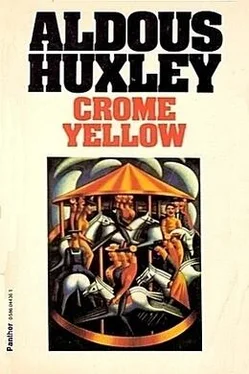"You must concoct an excuse."
"I suppose you're right."
"I know I am," said Mary, who was recovering all her firm self–possession. "You can't go on like this, can you?"
"No, I can't go on like this," he echoed.
Immensely practical, Mary invented a plan of action. Startlingly, in the darkness, the church clock struck three.
"You must go to bed at once," she said. "I'd no idea it was so late."
Denis clambered down the ladder, cautiously descended the creaking stairs. His room was dark; the candle had long ago guttered to extinction. He got into bed and fell asleep almost at once.
Denis had been called, but in spite of the parted curtains he had dropped off again into that drowsy, dozy state when sleep becomes a sensual pleasure almost consciously savoured. In this condition he might have remained for another hour if he had not been disturbed by a violent rapping at the door.
"Come in," he mumbled, without opening his eyes. The latch clicked, a hand seized him by the shoulder and he was rudely shaken.
"Get up, get up!"
His eyelids blinked painfully apart, and he saw Mary standing over him, bright–faced and earnest.
"Get up!" she repeated. "You must go and send the telegram. Don't you remember?"
"O Lord!" He threw off the bed–clothes; his tormentor retired.
Denis dressed as quickly as he could and ran up the road to the village post office. Satisfaction glowed within him as he returned. He had sent a long telegram, which would in a few hours evoke an answer ordering him back to town at once—on urgent business. It was an act performed, a decisive step taken—and he so rarely took decisive steps; he felt pleased with himself. It was with a whetted appetite that he came in to breakfast.
"Good–morning," said Mr. Scogan. "I hope you're better."
"Better?"
"You were rather worried about the cosmos last night."
Denis tried to laugh away the impeachment. "Was I?" he lightly asked.
"I wish," said Mr. Scogan, "that I had nothing worse to prey on my mind. I should be a happy man."
"One is only happy in action," Denis enunciated, thinking of the telegram.
He looked out of the window. Great florid baroque clouds floated high in the blue heaven. A wind stirred among the trees, and their shaken foliage twinkled and glittered like metal in the sun. Everything seemed marvellously beautiful. At the thought that he would soon be leaving all this beauty he felt a momentary pang; but he comforted himself by recollecting how decisively he was acting.
"Action," he repeated aloud, and going over to the sideboard he helped himself to an agreeable mixture of bacon and fish.
Breakfast over, Denis repaired to the terrace, and, sitting there, raised the enormous bulwark of the "Times" against the possible assaults of Mr. Scogan, who showed an unappeased desire to go on talking about the Universe. Secure behind the crackling pages, he meditated. In the light of this brilliant morning the emotions of last night seemed somehow rather remote. And what if he had seen them embracing in the moonlight? Perhaps it didn't mean much after all. And even if it did, why shouldn't he stay? He felt strong enough to stay, strong enough to be aloof, disinterested, a mere friendly acquaintance. And even if he weren't strong enough…
"What time do you think the telegram will arrive?" asked Mary suddenly, thrusting in upon him over the top of the paper.
Denis started guiltily. "I don't know at all," he said.
"I was only wondering," said Mary, "because there's a very good train at 3.27, and it would be nice if you could catch it, wouldn't it?"
"Awfully nice," he agreed weakly. He felt as though he were making arrangements for his own funeral. Train leaves Waterloo 3.27. No flowers…Mary was gone. No, he was blowed if he'd let himself be hurried down to the Necropolis like this. He was blowed. The sight of Mr. Scogan looking out, with a hungry expression, from the drawing–room window made him precipitately hoist the "Times" once more. For a long while he kept it hoisted. Lowering it at last to take another cautious peep at his surroundings, he found himself, with what astonishment! confronted by Anne's faint, amused, malicious smile. She was standing before him,—the woman who was a tree,—the swaying grace of her movement arrested in a pose that seemed itself a movement.
"How long have you been standing there?" he asked, when he had done gaping at her.
"Oh, about half an hour, I suppose," she said airily. "You were so very deep in your paper—head over ears—I didn't like to disturb you."
"You look lovely this morning," Denis exclaimed. It was the first time he had ever had the courage to utter a personal remark of the kind.
Anne held up her hand as though to ward off a blow. "Don't bludgeon me, please." She sat down on the bench beside him. He was a nice boy, she thought, quite charming; and Gombauld's violent insistences were really becoming rather tiresome. "Why don't you wear white trousers?" she asked. "I like you so much in white trousers."
"They're at the wash," Denis replied rather curtly. This white–trouser business was all in the wrong spirit. He was just preparing a scheme to manoeuvre the conversation back to the proper path, when Mr. Scogan suddenly darted out of the house, crossed the terrace with clockwork rapidity, and came to a halt in front of the bench on which they were seated.
"To go on with our interesting conversation about the cosmos," he began, "I become more and more convinced that the various parts of the concern are fundamentally discrete…But would you mind, Denis, moving a shade to your right?" He wedged himself between them on the bench. "And if you would shift a few inches to the left, my dear Anne…Thank you. Discrete, I think, was what I was saying."
"You were," said Anne. Denis was speechless.
They were taking their after luncheon coffee in the library when the telegram arrived. Denis blushed guiltily as he took the orange envelope from the salver and tore it open. "Return at once. Urgent family business." It was too ridiculous. As if he had any family business! Wouldn't it be best just to crumple the thing up and put it in his pocket without saying anything about it? He looked up; Mary's large blue china eyes were fixed upon him, seriously, penetratingly. He blushed more deeply than ever, hesitated in a horrible uncertainty.
"What's your telegram about?" Mary asked significantly.
He lost his head, "I'm afraid," he mumbled, "I'm afraid this means I shall have to go back to town at once." He frowned at the telegram ferociously.
"But that's absurd, impossible," cried Anne. She had been standing by the window talking to Gombauld; but at Denis's words she came swaying across the room towards him.
"It's urgent," he repeated desperately.
"But you've only been here such a short time," Anne protested.
"I know," he said, utterly miserable. Oh, if only she could understand! Women were supposed to have intuition.
"If he must go, he must," put in Mary firmly.
"Yes, I must." He looked at the telegram again for inspiration. "You see, it's urgent family business," he explained.
Priscilla got up from her chair in some excitement. "I had a distinct presentiment of this last night," she said. "A distinct presentiment."
"A mere coincidence, no doubt," said Mary, brushing Mrs. Wimbush out of the conversation. "There's a very good train at 3.27." She looked at the clock on the mantelpiece. "You'll have nice time to pack."
"I'll order the motor at once." Henry Wimbush rang the bell. The funeral was well under way. It was awful, awful.
"I am wretched you should be going," said Anne.
Denis turned towards her; she really did look wretched. He abandoned himself hopelessly, fatalistically to his destiny. This was what came of action, of doing something decisive. If only he'd just let things drift! If only…
Читать дальше











